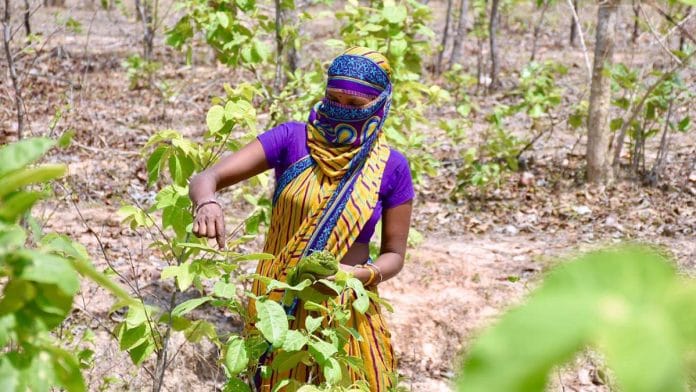Raipur: Chhattisgarh is looking to build an organised industry around minor forest produce (MFP) with an aim to benefit around 17 lakh tribal families currently working as gatherers, officials in the state government have said.
MFP is non-timber forest produce of plant origin, for example, tendu leaves, which are used to make bidis, bamboo and honey. Chhattisgarh government officials estimate the state’s MFP industry to have a trade potential of Rs 1,200 crore.
The initiative comes amid a larger push in the state to boost its MFP sector. Just earlier this month, it was announced that the state set a record with its procurement of MFP under the minimum support price (MSP) programme this financial year — accounting for nearly 47,000 metric tonnes or 73 per cent of the MFP procured at MSP by the central government from across the country.
Speaking to ThePrint, an official of the Chhattisgarh State Minor Forest Produce Trading and Cooperative Federation said they plan to make efforts to enhance the income of MFP gatherers, provide better infrastructure to them, and train them in ways they can add value to the products.
“MFP in Chhattisgarh has huge potential to be developed as a separate sector of economy, but that will be done in a planned and organised way. MFP gatherers, mainly women self-help groups (SHGs), will be trained adequately to curtail losses,” said Anand Babu, the additional managing director of the federation.
“This year, till March 2021, the federation will procure non-tendu leaf MFP worth Rs 130 crore as against the target of almost Rs 225 crore. However, procurement in the next financial year will cross the Rs 200 crore mark,” he added.
According to Babu, “the quality and scale of MFP collected in tribal areas of Chhattisgarh” have led “nearly 15 firms to express interest in setting up processing units worth Rs 76 crore”.
“Currently, only 5 per cent of gathered minor forest produce is processed at the source (before procurement),” he said.
In the new collection season, that is, after March 2021, there will be more groups of gatherers and collection centres, he added.
“Abundance of MFP has made Chhattisgarh the largest contributor to the country’s non-timber forest produce pool ever since these products were brought under the central government’s MSP regime in 2013-14,” he said.
Also Read: Chhattisgarh tribals to get community forest rights. Activists welcome plan but with caution
‘A boost for MFP under Baghel’
Chhattisgarh Principal Chief Conservator of Forests (PCCF) Rakesh Chaturvedi noted that the state is the only one in India where 52 types of MFP are purchased at MSP.
“Of these, 38 varieties are part of centrally fixed MSPs and 14 are solely procured by the state government. The MFP sector, including the collection of tendu leaves, has a trade potential of more than Rs 1,200 crore in Chhattisgarh,” he said. “It will be harnessed more professionally to provide better yields and returns to the gatherers in coming days.”
Babu said the tax and other incentives offered by the state government in its new industrial policy — announced last year — will also promote MFP-based industry in forest areas and enhance employment opportunities for forest-dwellers.
The Bhupesh Baghel government, he added, also increased the procurement prices of several MFP products after coming to power in 2018.
The price of tendu leaf, for example, was increased from Rs 2,500 to Rs 4,000 per standard bag (a standard bag of tendu contains 1,000 bundles of 50 tendu leaves each).
The MSP for mahua was increased to Rs 30/kg from Rs 17/kg, for tamarind to Rs 36/kg from Rs 25/kg, and for chironji kernels to Rs 126/kg from Rs 93.
The price of Rangini Lakh was increased to Rs 220/kg from Rs 130/kg, Kusmi Lakh’s to Rs 300/kg from Rs 200/kg, and honey’s to Rs 225/kg from Rs 195. According to officials, this has directly benefited more then 17 lakh families of MFP gatherers by more then Rs 800 crore.
Also Read: Chhattisgarh to spend Rs 225 crore to buy forest produce from tribals, bypass middle-men






